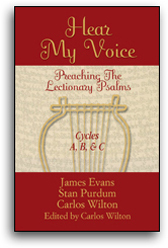Psalm 149 (Proper 18 / Ordinary Time 23 / Pentecost 15)
Preaching
Hear My Voice
Preaching The Lectionary Psalms for Cycles A, B, C
(See All Saints, Cycle C, for an alternative approach.)
In the scheme devised by the Revised Common Lectionary committee, the weekly psalm is viewed less as a reading in its own right and more as a meditation in support of the First Lesson. But to consider Psalm 149 a meditation on the Passover story is a troubling thought. If verses 6-8 of the psalm, and especially verse 7, are to be taken as a comment on the meaning of the death of Egypt's firstborns, then those deaths have to be defined as Divinely approved "vengeance" and "punishment." Furthermore, the psalm appears to be hymn in support of holy war, and in this day with jihad having been forced into the national vocabulary, using Psalm 149 too enthusiastically seems objectionable.
But preachers who do choose to go with the psalm this week can profit by looking at its second sentence: "Sing to the Lord a new song." This is not the only psalm that calls for a new song, but here the summons is especially appropriate. The new song in this psalm seems to be a hymn to holy war, but in our day, holy war is now an old song, and one that does not serve us very well any more, if it ever did. So a sermon could be built on the question, "What new song should we sing to God today?"
Back in the 1970s, Barry Manilow had a hit with a song called "I Write The Songs." The opening line was, "I write the songs that make the whole world sing." It was a happy melody. The singer expressed the joy he felt from giving others the words to sing, to express their songs.
For David, the "sweet psalmist of Israel" (2 Samuel 23:1 RSV -- or see TEV, "the composer of beautiful songs for Israel") there must have been a similar pleasure. Sure, as a successful ruler, he was sometimes the object of Israel's praise, but his songs expressed joy at being able to point to God as the only one really worthy of praise. As David puts it in 2 Samuel 23:2, "The spirit of the Lord speaks through me, his word is upon my tongue." There must have been a delight that came from composing the psalms that helped the people of Israel praise their Maker.
What we need to do is to be reporters of God's deeds, songsters singing of God's glory.
-- S. P.
In the scheme devised by the Revised Common Lectionary committee, the weekly psalm is viewed less as a reading in its own right and more as a meditation in support of the First Lesson. But to consider Psalm 149 a meditation on the Passover story is a troubling thought. If verses 6-8 of the psalm, and especially verse 7, are to be taken as a comment on the meaning of the death of Egypt's firstborns, then those deaths have to be defined as Divinely approved "vengeance" and "punishment." Furthermore, the psalm appears to be hymn in support of holy war, and in this day with jihad having been forced into the national vocabulary, using Psalm 149 too enthusiastically seems objectionable.
But preachers who do choose to go with the psalm this week can profit by looking at its second sentence: "Sing to the Lord a new song." This is not the only psalm that calls for a new song, but here the summons is especially appropriate. The new song in this psalm seems to be a hymn to holy war, but in our day, holy war is now an old song, and one that does not serve us very well any more, if it ever did. So a sermon could be built on the question, "What new song should we sing to God today?"
Back in the 1970s, Barry Manilow had a hit with a song called "I Write The Songs." The opening line was, "I write the songs that make the whole world sing." It was a happy melody. The singer expressed the joy he felt from giving others the words to sing, to express their songs.
For David, the "sweet psalmist of Israel" (2 Samuel 23:1 RSV -- or see TEV, "the composer of beautiful songs for Israel") there must have been a similar pleasure. Sure, as a successful ruler, he was sometimes the object of Israel's praise, but his songs expressed joy at being able to point to God as the only one really worthy of praise. As David puts it in 2 Samuel 23:2, "The spirit of the Lord speaks through me, his word is upon my tongue." There must have been a delight that came from composing the psalms that helped the people of Israel praise their Maker.
What we need to do is to be reporters of God's deeds, songsters singing of God's glory.
-- S. P.


